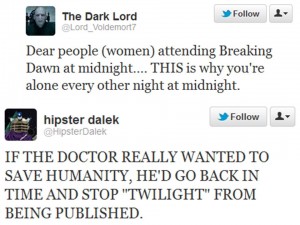I’m a little behind on watching Glee. Really, I’m perpetually behind on all TV; I don’t think there’s been a time since Star Trek: Voyager went off the air that I tuned in to watch something in a regularly scheduled time slot—not least because that was the point when I stopped having regular access to TV.
No TV, plus a number of other factors, mean that I am late to the party on discussing Glee‘s “The First Time” episode, which aired on November 8, 2011. But it annoyed me enough that I’m going to write about it anyway.
The episode has gotten some positive press because it depicts gay teens making the same virginity-losing decisions as heterosexual ones, rah-rah once again Ryan Murphy makes the world safe for people like him.
Though, in their defense, I think that the decision to be really vague about both the heterosexual and homosexual sex scene avoided the whole problem of the double standard whereby a much lower bar for what’s offensive exists for gay sex than heterosex, so yay for that.
Glee tends to do an ok job representing white gay men—Kurt is a little stereotypical, but to some extent that’s because they cast Chris Colfer and that’s how he is, so I’m ok with it—but a pretty horrendous job with everybody else.
In particular, in this episode, the character of Rachel is done a disservice–and through her, so are teen girls.
Rachel has very clear plans for herself, such as moving to New York City, attending the fictional New York Academy of the Dramatic Arts, starring on Broadway, etc. One of these plans, the series has established, is not to have sex until she’s 25. In “Grilled Cheesus” (2.02), Rachel and Finn have this exchange:
Rachel:I need to know that when I’m 25, and have won a bunch of Tonys, and I’m ready to have intercourse and babies, that those babies will be raised in a certain way.
Finn: You’re really not going to have sex until you’re 25?
The show has enough continuity that this is referenced again in “The First Time” (3.05)
Finn:Why now? The last time we talked about this you said you wanted to wait until you won a Tony.
Rachel: Or any other major award. Emmy, Golden Globe. People’s Choice would’ve gotten you to third base.
Now, I’m not claiming that this is a good plan, necessarily. It’s indicative of someone who underestimates the power of social norms on them and overestimates their own control of their life to be able to plan so far out. It is, that is, the plan of someone quite young, as Rachel is.
But Rachel, over and over in the show, is someone who sticks to her guns. She decides what she thinks is right and she goes for it wholeheartedly. And, especially if it has to do with her career, god help you if you get in her way. This person would totally believably have sex to further her acting ability, despite Brett Berk’s contention in Vanity Fair’s “Gay Guide to Glee“ entry that
as desperate, conniving, and monomaniacal as Rachel is about advancing her acting career, it is neither believable nor even amusing to imagine that she might be “convinced” to try out intercourse in order to better her portrayal of a character like Maria in the high-school production of West Side Story. (It is, in fact, grotesque.)
Grotesque it may be, or “supremely stupid, even considering ‘Glee’s’ tenuous tether to reality,” as Mark A. Perigard described it at BostonHerald.com, but it is actually pretty believable because it’s congruent with the Rachel who sent exchange student Sunshine Corazon to a crack house because she felt threatened by her talent.
However, for all her selfishness, Rachel can be selfless too. In 1.13, after telling Finn that Quinn had misled him to think that her pregnancy was his child (for selfish reasons), she was genuinely sorry and offered to let Quinn hit her if it made her feel better. Rachel organized interfaith prayer with one glee club member who tolerates her (Mercedes) and one who verges on hatred (Quinn) when Kurt’s dad Burt had a heart attack in 2.02.
She arranged with Finn to throw the duets competition in 2.04—unexpected from the super-competitive, rival-sabotaging Rachel—so that new member Sam could win and feel welcomed to the team. In 3.06, Rachel withdrew from the class president election in order to help Kurt’s chances at winning and thus help him get into NYADA.
This Rachel might well have been selfless enough to offer her virginity to Finn as a consolation prize for losing out on his football dreams.
But the writers shouldn’t have gone through with it. Not like that. Because, at least under our culture’s odd relationship to sex (which the show seems to share), the first time is supposed to be a special event for Rachel, but in this episode it wasn’t even about her.
And, like, I’ll admit that as a Faberry shipper (Rachel and Quinn) Finchel (Rachel and Finn) is objectionable all by itself, but I have a more specific critique of Finn here. Even in this episode when we’d imagine Finn will be set up as a good boyfriend so that he “deserves” the ending, he feeds Rachel, a vegan, actual meat. And then doesn’t confess. And then takes advantage of Rachel’s sympathy for him.
That’s pretty horrifying, and that fact has gotten missed in the discussion about the show, at times glaringly so, as when Jerome Wetzel of Examiner.comconcludes that there’s nothing more to critique after the have-sex-for-acting plot is resolved, commenting that “once Rachel and Blaine stop trying so hard and enjoy being in their respective relationships, sex does happen for each.” Blaine and Kurt do indeed “do the deed” out of enjoying being with each other, but not Rachel.
And, you know, I get it. Kids make bad decisions. I know I made some. And they make the decision to have sex for worse reasons than wanting to comfort their partner. As Vanity Fair’s Berk reminds us, “an overwhelming physical desire for Finn, or some socially motivated goal of impressing her friends” would have been more in line with “the two core incentives for teens.” And like Berk, “I appreciated that she, as the girl, was the instigator” rather than the usual storyline of “boy pressures girl.”
But if Glee is trying to do the Very Special Episode shtick, they needed to do better. Because I, too, “wish I could un-see that Endless Love remake these two created in front of the fireplace at the Hudson/Hummels, and un-hear Rachel’s creepy pledge to ‘give Finn something no one else will ever get'” (Berk).
I wish they hadn’t even filmed it. I wish they had written Finn differently so that he wouldn’t take advantage of Rachel’s moment of generosity. I wish they themselves hadn’t taken advantage of the character of Rachel. Because that just replicates in the structure of the episode that story of girls being pressured into sex for reasons that have nothing to do with them that they tried to avoid in the narrative itself.


